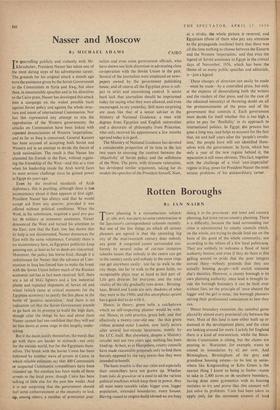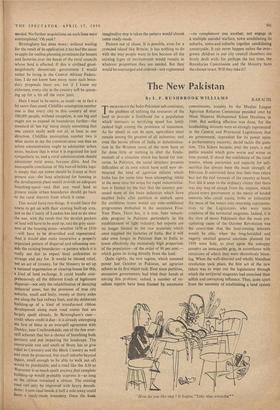Rotten Boroughs
By IAN NAIRN MOWN planning is a contumacious subject; I yr. obt. srvt. was party to some contumacion in the Spectator's correspondence columns recently. But one of the few things on which all serious planners are agreed is that the sprawling big city of the mid-twentieth century does nobody any good. A congested centre surrounded uni- formly by several miles of cut-rate imitation suburbs means that nobody in the centre can get to the country easily and nobody in the outer rings can get anywhere easily : too far to walk to the city shops, too far to walk to the green fields, no recognisable place near at hand to feel part of. Life gets drearier for everyone, and the total vitality of the city gradually runs down : Birming- ham, Bristol and Leeds are only shadows of what they were in the 1900s, and this amorphous sprawl has a good deal to do with it.
Hence, in theory, green belts, a catchphrase which no self-respecting planner would be with- out. Hence, in cold practice, green belt, and that effectively a twenty-year-old one : the thin green ribbon around outer London, now fairly secure after several last-minute incursions, mostly by the LCC itself. But elsewhere, despite a Ministry circular sent out two years ago, nothing has been fixed up. At best, as in Hampshire, county councils have made reasonable proposals only to find them fiercely opposed by the very towns that they were intended to benefit.
The basic trouble is that our cities and especially their councillors have not grown up. Whether from'folie de grandeur or a need to oil the various political machines which keep them in power, they all want more rateable value, bigger area, bigger population, extended boundaries, more houses. Having ceased to empire-build abroad we are busy doing it in the provinces : not town and country planning, but town versus country planning. There is a difficulty, because the land surrounding our cities is administered by county councils which, on the whole, are trying to decide land use on the basis of the good of the whole community, not according to the whims of a few local politicians. They are unlikely to welcome a flood of local authority houses, and even if they do there is this galling wound to pride that the poor integers moved there—nobody pretends that they are actually housing people—will enrich someone else's statistics. However, a county borough is its own planning authority; once land is brought in- side the borough boundary it can be built over without foss, on the principle of 'once aboard the lugger and the girl is mine,' the borough planners salving their professional consciences as best they can.
Hence boundary extension, the cannibal game played by almost every provincial city between the wars. Most of this land is now either built up or doomed in the development plans, and the cities are looking around for more. Luckily for England there is a kind of moratorium, whilst the Boun- daries Commission is sitting, but the claims are pouring in : Worcester, for example, wants to extend its boundaries by 62 per cent. And Birmingham, Birmingham of the grey and grandiose housing estates—to be lost in some- where like Kingstanding or Kitts Green is the nearest thing I know to being in limbo—wants to take in 2,400 acres on its southern boundary, having done some gymnastics with its housing statistics to try and prove that this amount will just solve its problems. 'Care had been taken to apply only for the minimum amount of land needed. No further acquisitions on such lines were contemplated.' Oh yeah?
Birmingham has done more: without waiting for the result of its application it has had the sauce to apply for outline planning permission for houses and factories over the heads of the rural councils whose land is affected. If this is civilised good- neighbourly democratic government I would rather be living in the Central African Federa- tion. I do not know how many more such boun- dary proposals there are, but if I know my aldermen, every city in the country will be queue- ing up for a bit off the rural joint.
Here I want to be naïve, as usual—or in fact a bit more than usual. Childlike assumption number one is that every city in this country of over 100,000 people, without exception, is too big and ought not to expand its boundaries further—the standard of 'too big' being simply something that one cannot easily walk out of, at least in one direction. Childlike assumption number two is what seems to me the common-sense one that an urban administration ought to administer urban areas, because that is what it is organised for and sympathetic to, and a rural administration should administer rural areas, because ditto. And the inescapable conclusion of this box-of-bricks logic is simply that our towns should be frozen at their present size—the land scheduled for housing in the development plans would provide an adequate breathing-space—and that any rural land at present inside urban boundaries should go back to the rural districts from which it came.
This would force two things. It would force the towns to get on with their existing built-up area, just as the County of London has had to do since the war, with the result that the derelict pockets of land will have to be used up, and the grey same- ness of the housing areas—whether 1870 or 1930 —will have to be diversified and regenerated. And it would also make imperative a properly organised pattern of dispersal and rehousing out- side the existing boundaries—a pattern which it is really not fair to expect local authorities to arrange and pay for. It would be blessed relief, not an act of tyranny, for the Ministry to set up a national organisation or clearing-house for this, a kind of land exchange. It could handle com- prehensively all the different kinds of legitimate dispersal—not only the rehabilitation of decaying industrial areas, but the provision of true city suburbs, small and leafy, twenty or thirty miles out along the fast railway lines, and the deliberate building-up of a kind of transformed ribbon development along main road routes that are largely spoilt already. In Birmingham's case— credit where credit is due—it is already attempting the first of these in an overspill agreement with Dawley, near Coalbrookdale, one of the few over- spill schemes that has a chance of benefiting both partners and not impairing the landscape. The countryside east and south of Brum has to give relief to Coventry and the Black Country as well and must be protected; but small suburbs beyond (again, small enough to be able to walk out of) would be practicable, and a road like the A38 to Worcester is so much spoilt anyway that complete building-up would probably improve it-7-as -long as the ribbon remained a ribbon. The existing road can only be improved with heavy demoli- tions : a new road beside it half a mile away could form a ready-made boundary. Once the basic imaginative step is taken the pattern would almost come ready-made.
Pattern out of chaos. It is possible, even for a crowded island like Britain; it has nothing to do with the way people want to live because all the existing types of environment would remain in whatever proportion they are needed. But they would be rearranged and ordered—not regimented —to complement one another, not engage in a multiple suicidal warfare, town annihilating its suburbs, town-and-suburbs together annihilating countryside. It can never happen unless the over- grown children in our city council chambers are firmly dealt with; for perhaps the last time, the Boundaries Commission and the Ministry have the chance to act. Will they take it?



































 Previous page
Previous page